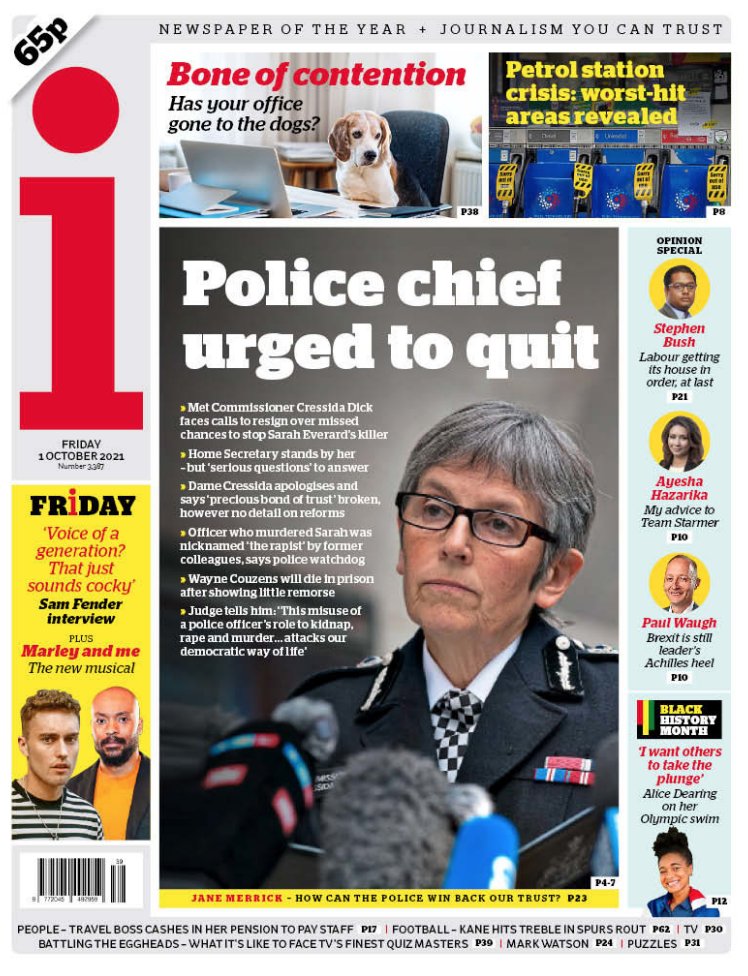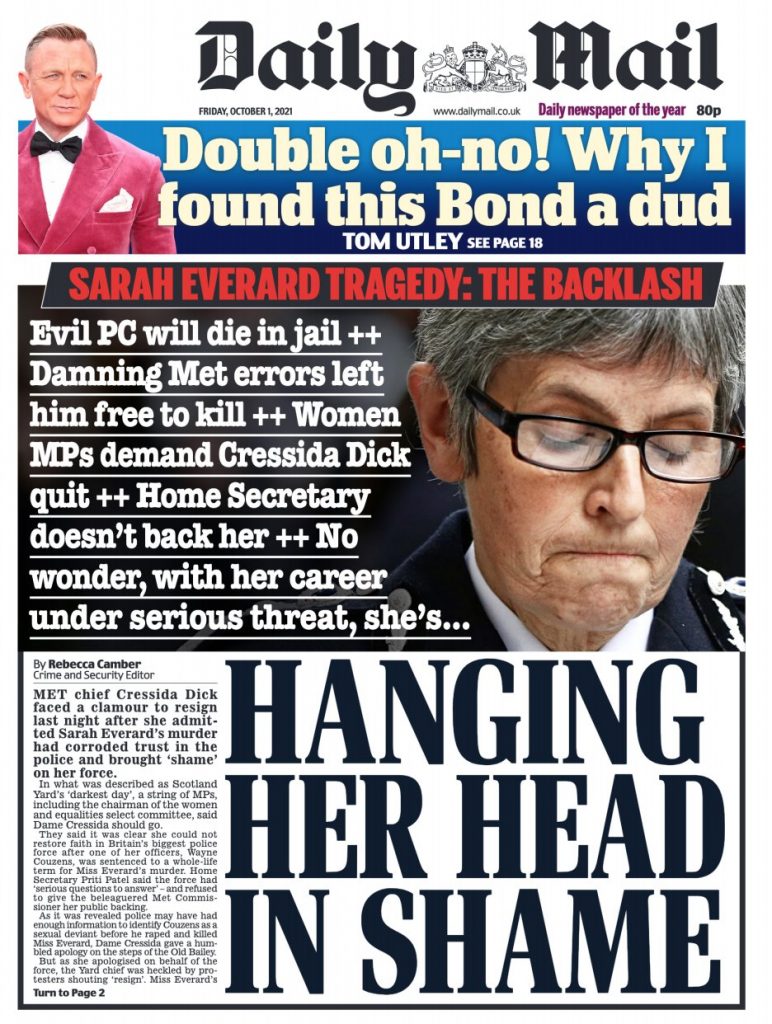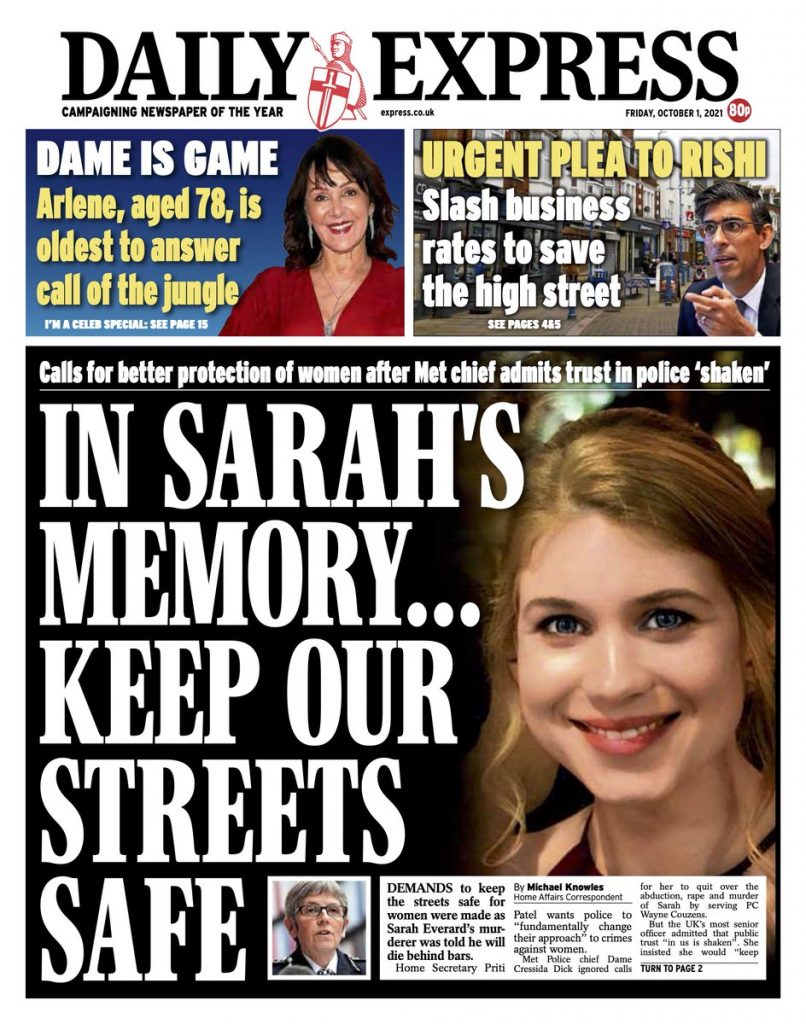What Now?
If not already done, the sentencing remarks of Lord Justice Fulford should be read by every MP, Cabinet Minister, police chief, Police & Crime Commissioner and anyone else involved in our criminal justice system. Paragraphs 19 and 23 set out eloquently – in words which should be taken particularly to heart by the Home Secretary and the Justice Secretary – the importance of law and order and what happens when trust in the police is undermined. As the Judge put it – “the authority of the police is to a truly significant extent dependant on the public’s consent and the power of officers to detain, arrest and otherwise control important aspects of our lives is only effective because of the critical trust that we repose in the constabulary, that they will act lawfully and in the best interests of society.” That trust has been severely undermined by Couzens’ crimes. Read Sarah Everard mother’s statement if you need proof: “In the evenings, at the time she was abducted, I let out a silent scream: Don’t get in the car, Sarah. Don’t believe him. Run!” It will not be just her who thinks the police cannot be believed. The damage done to policing is incalculable.
What should happen now?
- Politicians need to stop treating senior police officers as indispensable. They aren’t. A well-functioning police force is. But a well-functioning one should not be dependant on any one individual. The rush by No 10, the Home Secretary, even the Labour leader to express confidence in the Met Commissioner, Cressida Dick, is grotesque given what we know about the Met’s failures in the hiring and vetting of Couzens. Were she competent at her job, it would be OTT. But she is not. She has presided over or been responsible for a number of serious problems. She shows no sign of understanding that these are not merely a series of unfortunate events but signs of deeper-rooted issues, ones she seems incapable of addressing. Or perhaps unwilling. The police seem to think that because theirs is a critical public function everything they do is in the public interest and therefore it is impermissible to attack them. It is a “L’etat c’est moi” approach which does much to explain the defensive, “no true policeman” approach adopted in response to every scandal, an approach which appears to value protecting the police’s reputation above anything else. Cressida Dick should have gone a long time ago. If, as reported, some Cabinet Ministers think she has to stay because “Who else is there?” that makes reform ever more necessary. An organization which has to put up with a second-rate leader because possible replacements are even worse is an organization which has forfeited any right to be defended.
- There needs to be a thorough independent review into the police. And not just the Met. The Greater Manchester Police has just received an excoriating report into its multiple failures over a number of years, failures which, in the words of the Inspectorate: “This enduring service failure has given cause for concern about public safety in Greater Manchester.” There have been similar problems in other forces, over years. It is one damn thing after another in one force after another, year after year. To a financial investigator, the police seem very like finance was for a very long time: arrogant, convinced of their indispensability, resistant to change unless there was something in it for them, too willing to defend the indefensible and with scarce regard for the rules it was meant to follow. Something like the Parliamentary Commission on Banking Standards is needed. Its report – and what it revealed – the tough no-nonsense, take no prisoners language it was couched in – shamed enough senior managers to start the necessary changes. The form is less important than its substance. But all aspects of police culture, behaviour, recruitment, training, discipline, management, leadership etc need to be reviewed. The cosy, closed world of the police, of retired policemen moving into the IOPC and HMIC needs to be crow-barred open. Policing is a vital function, not an untouchable priesthood.
- Culture change is hard, extremely hard. It needs three things above all: (1) senior leadership who truly understand the need for change – usually learnt after a near death experience; (2) external stakeholders who put sustained pressure to make that change; and (3) persistent hard work at all levels over years to effect it. What does good culture look like? How long have you got? But these elements are essential:
- Strong leadership which takes responsibility.
- Proper due diligence and thorough vetting both before recruitment and throughout employment.
- No tolerance of minor misdemeanours.
- A culture of “speak up” and an understanding that turning a blind eye, having misplaced loyalty to wrongdoers is unprofessional, wrong and dangerous.
- An effective training system.
- An effective disciplinary system.
- Accepting your mistakes and treating them as learning opportunities not as something to be PR’d away.
- There needs to be a thorough police investigation into what Couzens was doing in his various roles at the Met and elsewhere and what the Met and those other organisations knew or ought to have known and done. The police got the evidence which caught Couzens. But there are some troubling loose ends: (1) Why did he give his police number to the car hire company? It is such an obviously silly mistake and so inconsistent with all his other careful preparations, both before and after his crimes. Did he have a mate who could make his telephone number disappear if it came up? (2) Did he give his police number because he had hired cars before for nefarious – if less lethal – purposes? He concocted a story about having to find a replacement girl for a gang – lies when it came to explaining what he was doing the night he killed Sarah. But if he was involved in some way in trafficking or with criminal gangs, it might explain why he gave such a story. Did he say something that was true – in another context? (3) Why was he able to wipe his police phone and so conveniently just before his arrest? Was he tipped off?
- The Met needs to find a way of earning back the trust of the public, above all, women. Not simply a strategy for how to deal with violence against women and girls; but a strategy for how it deals with its own officers who commit sexual misconduct. Over half of Met officers who have committed sexual misconduct have kept their jobs. Why? Why does the Met have any officers in it who have committed criminal offences?
How many of these will happen? One. Maybe two. They will not be enough. A Sir Robert Mark is needed. Instead, we have a Dick as Head of what is meant to be our premier police force. Good policing matters. We should demand better.


